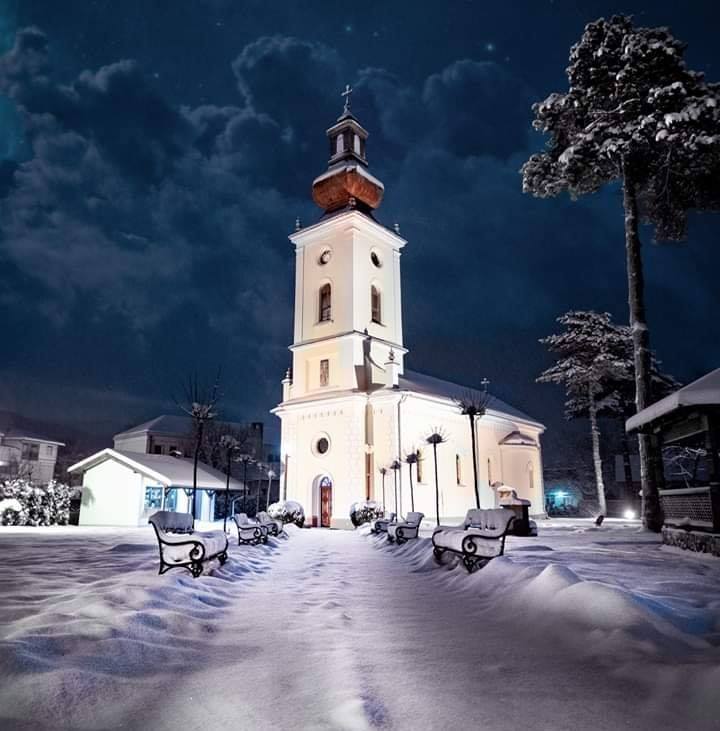[On the conditions in Serbia after the Battle of Kosovo]
This battle took place in the year 6897 [1389], in the month of June, on the 15th day. And he [Lazar] received a martyr’s death and is now seen as alive in the great monastery called Ravanica, which he himself built, publicly taken among them [the martyrs] and converses with them in heaven. And then, there was no place in the entire land where the sad voice of wailing and lamentation was not heard, which could not be compared with anything else, so that the air was filled, so that in all these regions Rachel wept and would not be comforted – not only because of [the slain] children of hers, but because of the God-chosen lord, for he [Lazar] is no more and because they [the children] are no more. [Book of the Prophet Jeremiah, 31, 15; Gospel according to Matthew, 2, 18.]
And he reached into prosperity and eternity, and to leave aside [his] lovingly honoured buildings of churches and monasteries, the release of prisoners and almsgiving, which like from a spring pours forth the form of every virtue and [his] fulfilment of commandments.
In his life, he built strong cities, and also [the city] called Kruševac, in which he erected the most beautiful church to the great first martyr, archdeacon Stephen, for the prayers for his ever-remembered son [despot Stefan]. That is all about that.
And the lion who is called in his own language the Lightning (Bayezid), quickly returns to the east to sit on his father’s throne and to secure the empire from all sides. And if anyone objects to this, as to why I interweave this, let such people look into the imperial chronicle books and they will see that these books expound very much and extensively about the rulers, whether they speak in Jerusalem or in the Reigning City, [referring to Constantinople] and also the lives [of the rulers] of the surrounding lands, so as to make better known the lives of our pious and holy lords. It is enough if this is just mentioned.
And those who remained were poor and terrified by their plunder, for the calamity threatened not only from the Ismailis but also the western neighbours [Hungarians] prepared for war. In addition, there were internal conflicts among those who were subject to them; others, however, were like independents, so that with Mordechai, [Mordechai, along with the Persian queen Esther, protected the Jewish people from persecution in Babylonian captivity] it can be said in riddles and prophetic dreams: “And behold a voice and a cry, unrest, thunders and an earthquake, and a rebellion on the land, and behold now not two dragons but many with reptiles, who came to fight. And there was a voice and all was disturbed by the voice of their cry, upon all people there was darkness and gloom by day and storms and wars, and every nation prepared to fight.” [Book of Esther, 1.1.] And we cried out to the Lord because of their loud shouting and from a small source came much water; and a great river flowed, light and the sun shone and the rivers rose and swallowed the glorious. Since this was so, messengers came to them from the great [Turkish emperor] and he said, like Nebuchadnezzar in his mind: “I will encompass the universe as with my hand on an egg.” The messengers agreed with the pious lady [Milica] about her youngest daughter Olivera and by the advice of the patriarch and the whole assembly of holy persons and the entire synod, she was given in marriage to the great Amir [Bayezid], that the Christ-named flock might be saved from the wolves that slaughtered it. And then her always mentioned brother [Stefan] went as an autocrat with his sister. And from then on, the Serbian land was enslaved so that Stefan himself with his brother Vukan and with his nobles and with the others had to come to him for homage every year. And the great emperor from then on did not deceitfully adorn himself with piety towards the great Constantine like Maximian to destroy him but treated him sincerely and with pure love as towards a beloved son, which you will find in [a certain] chapter, and before all these eastern ones he [Stefan] boasted as another sun or as a morning star.



